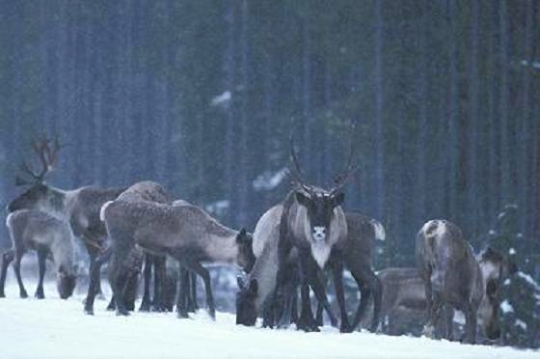The world’s 1,700 mountain caribou can chomp their lichens in peace — Forest Ethics and a coalition of Canadian environmental groups announced an agreement with the British Columbia government to protect more than 5 million acres of their home habitat in British Columbia’s forests.
The victory came after a five-year campaign targeting corporations and the regional government that either logged mountain caribou habitat or used paper from the mountainous, old growth forests favored by the caribou, which are not only the southernmost population of caribou but also the only remaining caribou population in the world in mountainous terrain.

This isn’t just good news for the mountain caribou and the forests, but also predators like mountain lions and wolves who eat the caribou — the B.C. government had been focused on shooting those animals as a way to protect the caribou; now, they’re going to seriously curtail these culls.
The campaign had won a major boost when Limited Brands, which publishes the Victoria’s Secret catalog, announced it would no longer buy paper derived from mountain caribou forests. The victory came after environmental activists dressed as Victoria’s Secret angels showed up outside stores with chainsaws in hand denouncing “Victoria’s Dirty Secret” — that the company was driving the destruction of pristine forests around the world.
This week’s victory is just the latest in a string of major successes for forest-saving corporate campaigns. Forest Ethics, Rainforest Action Network, Greenpeace, Dogwood Alliance and others have gotten Staples, Office Depot, Boise Cascade, Home Depot and many others to stop using wood or paper from endangered forests and start using far more recycled paper (you can thank these campaigns for the relatively high availability of recycled paper in most major office supply chains). What’s so remarkable about these campaigns is that they’ve happened while the rest of the environmental movement has been in defense mode.
And by reducing demand for old growth paper, they could make it easier for legislatively focused environmental groups to pass legislation protecting forests. Indeed, when Rainforest Action Network persuaded former forest villain Boise Cascade to clean up its act, part of their promise was to withdraw from a lawsuit attempting to overturn government protection for 58.5 million acres of roadless forests.
As for the caribou, there’s still work to do to get the B.C. government to implement its promises, so thank British Columbia premier Gordon Campbell for his action today.


